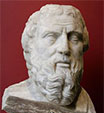 In a recent opinion piece for The Conversation, Timothy A. Joseph, associate professor of classics at the College of the Holy Cross, compares the reporting tactics and misrepresented experiences of “NBC Nightly News” anchor Brian Williams’ to those of ancient Greek and Roman historians.
In a recent opinion piece for The Conversation, Timothy A. Joseph, associate professor of classics at the College of the Holy Cross, compares the reporting tactics and misrepresented experiences of “NBC Nightly News” anchor Brian Williams’ to those of ancient Greek and Roman historians.
“Williams’s penchant for reaching and at times overreaching for eyewitness authenticity puts him in good company – with the reporters who stand at the very beginning of the Western tradition,” he writes.
Historians of ancient Greece and Rome placed a high priority on eyewitness reporting. “Time and research ‘in the field’ and the accompanying brushes with danger gave an historian credibility and authority. Eyewitness accounts also engaged the audience, who could follow in the footsteps of the author’s derring-do. But in their efforts to win over their audiences, Greek and Roman historians also fudged or fabricated their time in the field,” he continues.
Joseph observes that despite many inconsistences in his writing, Tacitus is commonly regarded as the greatest Roman historian for his biography of his father-in-law Agricola in 98 CE. In it, Tacitus refers to the emperor Domitian’s execution of the senators Helvidius and Senecio in 93 CE, events he unlikely attended.
Joseph also compares Williams’ story in Iraq to Tacitus, who appears to have inserted himself as an eyewitness and remorseful actor in much of his accounts: “In both cases the stretch of the truth in the word ‘we’ is effective: Tacitus and Williams take us there, share the lived experience of eyewitnesses, and keep our rapt attention,” he writes.
To read the full article click here.
This “Holy Cross in the News” item by Jacqueline Smith ’15.
'Brian Williams, Herodotus, and eyewitness reporting'
The Conversation
Read Time
1 Minute